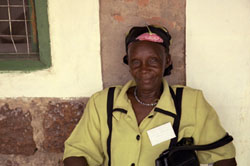Every day, villagers find Mary Biba Philip sitting under a tree in the center of town. There, they share their host of problems with her, seeking her intervention and advice. As mayor of the town of Yei in war torn southern Sudan, Philip has her hands full, but she makes sure she sees everyone who wants to talk to her. Day in, day out, Philip is reminded of the effects on the people of Yei by the civil war that has raged for almost two decades.
"We want peace, peace that is born from grassroots so everybody will know it is their peace," she said. "Then they will sustain the peace; they will own it so there will not be conflict or violence again."
Philip has a distinguished status in southern Sudan as the only female government official at the rank of mayor or higher. She doesn't hesitate to criticize the use of child soldiers to the army generals who use them. Her outspokenness and prominence in the community led her colleagues to tap her participation in a workshop in March 2002 on conflict resolution skills presented by The Carter Center.
Philip joined top officials from the rebel Sudan People's Liberation Movement/Army, representatives from nongovernmental organizations, and local government officials in learning how to build a constituency, the role of mediators and how to communicate with them, and conflict resolution methods.
"We learned how to negotiate to solve our conflicts," Philip said. "Now we have the knowledge."
The workshop, partnered with a parallel one presented by The Carter Center for the government of Sudan in Khartoum, prepared the parties for their participation in the Sudan peace talks convened in June 2002 by the Inter-Governmental Authority on Development, an East African body mandated to lead peace efforts in the country.
"The lack of civil society structure in southern Sudan lends itself to ad-hoc governance methods and can lead to conflict," said Alex Little, assistant project coordinator for the Conflict Resolution Program. "This training helped them to be better leaders and activists in their communities. The Carter Center gained a great deal of respect with the main actors in Sudan through these workshops. They saw that as dedication, and, in turn, they gave us their full attention."
As a nonpartisan, nongovernmental organization with access to world leaders and expertise in mediation, negotiation, and peace building, The Carter Center helps warring parties move from the battlefield to peace table, especially when official actors from governments or international organizations are unable to fill that role.
The Conflict Resolution Program strives to permanently resolve political conflicts, addressing their deeper causes and mediating comprehensive agreements designed to realize the full possibilities of peace. The program then remains involved to ensure that the difficult task of implementation follows.
 |
Mary Biba Philip, mayor of Yei, Rumbek, south Sudan, uses skills learned from The Carter Center to resolve conflicts. Philip is south Sudan's only female official to hold the rank of mayor. Photo by Alex Little. |
Please sign up below for important news about the work of The Carter Center and special event invitations.